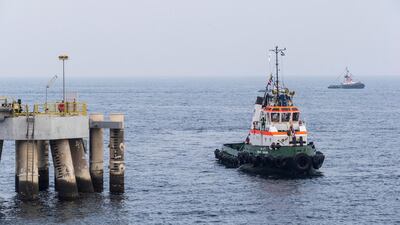Brent crude prices rose on Monday, trading at $71.77 per barrel after recouping earlier losses, as supply concerns increased.
Brent crude futures by mid afternoon UAE time were up $1.15. US West Texas Intermediate (WTI) futures were at $62.49 per barrel, up 83 cents. Global supplies have tightened after stringent US sanctions on producers, disruptions of Russian oil flows in Europe and maintenance at oilfields in the Atlantic Basin and Asia.
Also on Monday, Saudi Arabia, the largest crude exporter said two of its tankers anchored off the coast of Fujairah, one the world’s biggest bunkering hubs, were the target of a "sabotage" attack. The country’s energy minister Khalid Al Falih said in a statement on state media agency SPA that one of the vessels belonging to state producer Saudi Aramco was on its way to the eastern Saudi port of Ras Tanura be loaded with crude for customers in the US. The ministry said there were no casualties or oil spill, however the attacks caused "significant damage to the structures” of both vessels.
Saudi Aramco declined to comment on the extent of damage and costs incurred as a result of the sabotage.
The incident is against a backdrop of heightened political rhetoric in the Arabian Gulf. The US, which has a naval presence through its Fifth Fleet in Bahrain, has deployed an aircraft carrier and a bomber fleet to the Gulf as the White House toughens its stance against Iran, which is at odds with Washington's Gulf allies. Iran has not been formally accused or linked to the attacks in Fujairah.
Iran's Foreign Ministry called for further clarification about the incident. A spokesman warned against any "conspiracy orchestrated by ill-wishers" and "adventurism by foreigners" to undermine the maritime region's stability and security, the AP reported.
President Donald Trump's administration ended earlier waivers granted to Iran's key oil buyers earlier this month and also enforced sanctions against Iran's metals sector. Iran in return said that it would reduce its compliance with the 2015 nuclear deal, which had enabled the Islamic Republic over the last couple of years to sell its crude on the global energy markets in return for scale-back of its atomic ambitions.
Opec allies Saudi Arabia and the UAE are set to meet in the Saudi Red Sea port of Jeddah on Friday to review their obligations to a global pact of sovereign producers to restrict supply. They had pledged at the end of last month to boost output if needed to replace the nearly million barrels of Iranian crude that would be lost to the markets following the US cancellation of waivers.
Giovanni Staunovo, commodity analyst with Swiss bank UBS said that the markets would wait and watch to see if the attacks were a “one-off” incident or would be followed by more. They remained, however, susceptible and "very sensitive" to any “supply disruption risks”.
“Any additional disruption would further tighten the oil market,” he said.
"Considering that Saudi Arabia holds the most spare capacity in the world and how much oil is produced in the Middle East, renewed attacks in future are likely to result in market participants pricing in a geopolitical risk premium,” he added.
The attacks have revived Brent as well as WTI, the North American crude benchmark, from three weeks of bearishness, when they declined following the collapse of talks between the US and China over reaching a trade deal.
Brent had at the close of the last week, fallen to $70 per barrel after having reached $75 at the end of April, over fears of further tightening of supply with the end of the Iran waivers.
In its increase on Monday, Brent had “decoupled from equity indexes, major metals and soft commodities, all of which are in the red since trading resumed earlier Monday, in response to the US and China hitting a road block in their trade negotiations”, noted Vandana Hari, Singapore-based founder and chief executive of Vanda Insights.
A lack of clarity over the Fujairah incident could lead to more “jitters in the oil market".
“More speculation than facts behind those fears would make for even more volatile and unpredictable crude price swings,” she added.
Consultancy JBC Energy on Monday also warned of "a potentially growing risk premium in the region” following the reports of explosions off the coast of Fujairah.



